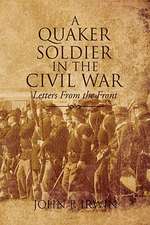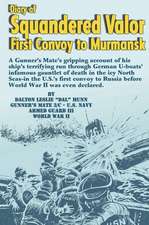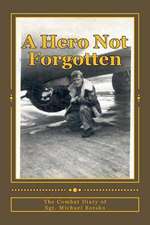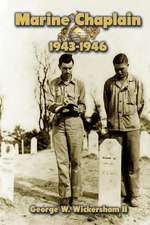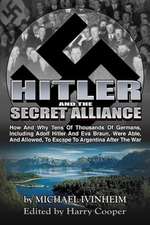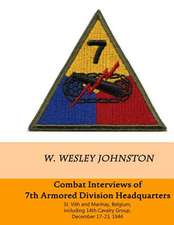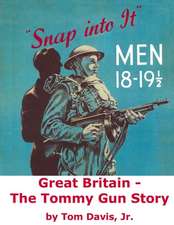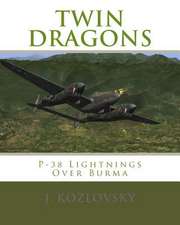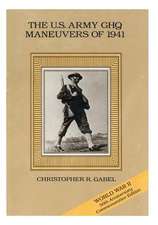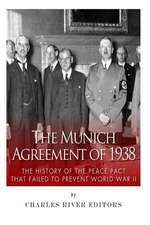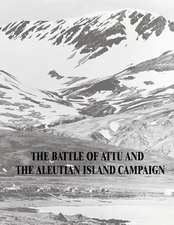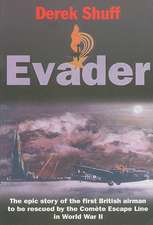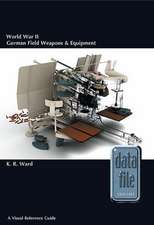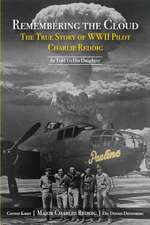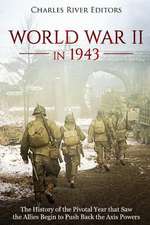Another River, Another Town: A Teenage Tank Gunner Comes of Age in Combat--1945
Autor John P. Irwinen Limba Engleză Paperback – 30 apr 2003
Another River, Another Town is the story of John P. Irwin, a teenage tank gunner whose idealistic desire to achieve heroism is shattered by the incredibly different view of life the world of combat demands. He comes to the realization that the realm of warfare has almost nothing in common with the civilian life from which he has come.
The interminable fighting, dirt, fatigue, and hunger make the war seem endless. In addition to the killing and destruction on the battlefield, Irwin and his crew are caught up in the unbelievable depravity they encounter at Nordhausen Camp, where slave laborers are compelled to work themselves to death manufacturing the infamous V-rockets that have been causing so much destruction in London, and that are expected one day to devastate Washington, D.C.
At the end of the war, the sense of victory is, for these men, overshadowed by the intense joy and relief they experience in knowing that the fighting is at last over.
From the Hardcover edition.
Preț: 87.68 lei
Nou
Puncte Express: 132
Preț estimativ în valută:
16.78€ • 17.50$ • 13.95£
16.78€ • 17.50$ • 13.95£
Carte disponibilă
Livrare economică 28 februarie-14 martie
Preluare comenzi: 021 569.72.76
Specificații
ISBN-13: 9780375759635
ISBN-10: 0375759638
Pagini: 192
Dimensiuni: 145 x 217 x 13 mm
Greutate: 0.26 kg
Editura: Random House Trade
ISBN-10: 0375759638
Pagini: 192
Dimensiuni: 145 x 217 x 13 mm
Greutate: 0.26 kg
Editura: Random House Trade
Notă biografică
John P. Irwin was born in Norristown, Pennsylvania, in 1926, and enlisted in the army in August 1944. He was honorably discharged in July 1946 and went on to Ursinus College in 1952, eventually earning his Ph.D. in philosophy from Syracuse University. He taught philosophy at Lock Haven University from 1964 until his retirement in 1990. He lives in Lock Haven, Pennsylvania.
From the Hardcover edition.
From the Hardcover edition.
Extras
CHAPTER 1
THE EDUCATION OF A HERO The German breakthrough in the Ardennes forest in France in December of 1944 and January of 1945 created a “bulge” extending into Allied positions. In the ensuing battle, one of the most horrendous and costly conflicts in the European theater in World War II—the Battle of the Bulge—the Allies lost enormous quantities of equipment, men, and supplies. The need to pursue the now retreating Germans required massive replacements of equipment and, especially, men. There was no way the war could continue without them.
At that very moment, I was being prepared—along with tens of thousands of other GIs—to help supply the need. I had found my heroic destiny in armored warfare, and my training at Fort Knox, Kentucky, resulted in my qualifying best as a “medium tank gunner.” I was a normal teenager, just eighteen, naïve, ignorant, fully absorbed in myself, and quite certain that I knew all I needed to know about the world—in fact, next to nothing—and was invulnerable to such subtleties as death and destruction. My education about the war was pretty much limited to the Why We Fight indoctrination films we were required to watch in basic training. Those films filled me with adolescent hostility toward Adolf Hitler and his armies, whose satanic goal, we were assured, was to conquer the world and make slaves of us all.
I was a griping-good soldier and wanted more than anything to go to Germany, find Hitler, and relieve the world of that monster once and for all. Not all the trainees I associated with shared my zeal; in fact, lots of guys were finding ingenious ways to avoid shipping out to the ETO (European Theater of Operations). Most of them were draftees. I, on the other hand, had enlisted, primarily to avoid finishing high school, which I detested. Surely war was preferable to high school!
I had as good a training at Fort Knox as nineteen weeks (including two weeks of gunnery school) would permit, and by the time I arrived in Europe, I had received the corporal stripes that went with being a gunner. I had the romantic idea that in some sense war was glorious. But the devastation I saw in France, Belgium, and Germany was so nearly total in places that my illusions began to fade. A lot of boys became men in those first days, though some of us held on to our heroic fantasies, our dramatic dreams of doing great things in battle. We rode across France and Belgium in “40-and-8s” of World War I vintage and ended up in the tangle of destruction in Germany called Stolberg.
At Stolberg we were detained in a replacement depot (or “repple-depple”) situated in a former chain factory. Our private quarters consisted of whatever vacant spots we could find on the filthy floor. The air was choked with the smoke of burning shoe impregnate, which was considered more valuable as a source of heat than as protection of shoes and feet against mustard gas. And everywhere, of course, were the countless barracks bags and other equipment the men were responsible for. I saw no glory here! But it was here that we were, without our knowledge or consent, assigned to various line outfits, our combat units. I did not know what my assignment would be when we finally convoyed out of Stolberg into the vast unknown of combat warfare. I still remember the tingle of excitement I felt as we traveled across the wreckage-strewn countryside. The carcasses of tanks, trucks, half-tracks, even planes, gave us some impression of what lay ahead for us.
One of the remarkable things about combat life is the almost total and perpetual blindness of individual soldiers when it comes to the matters that most immediately affect them. We never knew what was going on, where we were going, what we would be doing, or, of course, what the outcome would be. We thought we knew, because there was always an abundance of rumors, all said to be gleaned from the most authoritative sources. Next to mail and food, rumors are the lifeblood of military existence. And incredible as it may seem, though the rumors are generally proven either false or exaggerated, soldiers never lose faith in them. They are, after all, the only show in town when it comes to information.
Our small convoy traveled several hours before coming to a fairly extensive wasteland of frozen mud covered with many hundreds of military vehicles, most of them armored. To my left I noticed a small column of Sherman tanks on what was presumably a roadway. Around the area men were everywhere, walking, sitting on their bags, leaning on vehicles, and, invariably, smoking. The one thing more ubiquitous than rumor-mongering in this army was cigarette smoking. The ten or twenty GIs in the entire European theater who did not smoke were forever on the defensive to explain what their problem was. Besides the hundreds of tanks and half-tracks, there were large numbers of armored cars, trucks, peeps (later known as “jeeps”), command cars, and the like.
We dismounted from our trucks, lit up our cigarettes, and put our hands in our pockets. It was very cold. Our little convoy had been under the direction of a second lieutenant, and he had walked away somewhere, cigarette in mouth, hands in pockets, looking for someone to report to. The going rumor was that we had been assigned to the 3rd Armored Division with the First Army—a rumor that for once turned out to be correct. The information meant next to nothing to me, since I knew nothing about army units. Yet, for some reason I felt good about it. Now I had an identity, a home plate, so to speak, an address I could call my own. All I wanted now was to move out of this mudhole and on to my new unit.
There was a great deal of urgency in that open air repple-depple. The command here wanted to move us out just as urgently as most of us wanted to go, and our wish was about to be granted. The tanks lined up on the roadway were waiting for us to take them up to the assigned unit. One tank, however, stood off the roadway, apart from the others, undergoing some sort of maintenance. At the sound of a whistle we were lined up, counted off in fours, and directed to the various tanks. As it happened, three other guys and myself were assigned to the stray tank not in the column. As we stood dumbly by the tank, a captain came over to us, and, seeing my corporal stripes, he spoke to me.
“I need someone in charge here. You seem to be the ranking person, Corporal, so that will be you. Who’s a driver?”
A long moment dragged by. Finally a reluctant voice with a Virginia drawl said, “Uh, Ah guess that would be me.”
“Okay. You other two will go along for the ride. I’m Captain Harkin, and I’m in command of this convoy until we get to the 33rd Armored Regiment.”
“Sir?” I ventured.
“What is it?” he asked briskly.
“I thought we were going to the 3rd Armored Division.”
“Damn it, you are,” he snapped, “at least you are as soon as these mechanics say your tank is ready to roll. The rest of us are going to take advantage of what daylight is left and move out. You’ll be on your way to catch up to us within twenty or thirty minutes. But remember. This is hostile country. It hasn’t been completely cleared of the enemy. The SS may be anywhere around here waiting for a chance to create diversions. No lights! Get it? N-O-N-E. Even a lit cigarette outside your tank could draw fire from God knows where. You’ll be given driving instructions before you leave.”
He pulled his cigarette from his mouth and stomped it into the mud.
“Any questions?” he asked.
I asked the obvious one. “Will we have to shoot?”
“I hope not,” he said. “You certainly won’t be shooting that cannon, for God’s sake. Any other questions?”
After Captain Harkin left, we stood in a silent clump a short distance from our tank, watching the maintenance crew working on it.
“You a good driver?” I asked the Virginian, whose name turned out to be Bernie Graver.
“Ah’m qualified.” He shuddered. “Ah sure don’ wanna stan’ around here long, though.”
The other two were quiet. One—Eddie Evangelini—was no older than I and looked just as underage. “I never expected this kind of duty when I got drafted,” he whimpered. Our fourth member said very little, though he wore a funny smile, as though he knew something we didn’t. I wasn’t sure I liked him. He said his name was Hominy. Har-dee-har-har, I thought, so call me Grits!
It was forty-five minutes before our tank was ready to roll. Graver got directions from a lieutenant, who assured him he would have no trouble. Just stay on the road. When we get to a small town, the rest of the convoy will be waiting for us. But remember: NO LIGHTS!
No lights, and a cold winter dusk had settled in, making the road virtually invisible. To add to these troubles, a haze of dust hung in the frigid air from the tank convoy that had passed on ahead. Dust! Sherman tanks were technology’s answer to clean air. They were extremely efficient dust machines. Take one road caked with winter mud, drive a Sherman tank over it, listen to the clanking, crunching, and shrieking as the heavy treads grind the frozen mud to powder, and enjoy the spectacle of tremendous clouds of dust being blown into the air by the downward blast of the rear exhaust. And they said, “No lights!” From my perspective, lights wouldn’t have made a particle of difference.
Graver was obviously in the grip of terror. The mention of SS troopers had fired his brain. From that moment on he was a changed man. He had come under the control of a higher power called FEAR. His foot pressed that Sherman accelerator flat to the floor of the tank. It was never clear, at any given moment, whether or not we were on the road at all—not that it mattered that much to Graver. I could hear Evangelini utter a “Holy shit!” from the depths of the tank, but Hominy just stood on the back deck of the tank nonchalantly, as though it didn’t matter one way or another.
But it did matter. Graver could not see more than twenty yards before him, and he had those rolling thirty-five tons moving at about forty-five miles an hour. The impact of one tank upon another at that speed invariably produces effects no one would wish for. In the present case—unknown (and invisible) to us—the convoy that preceded us had stopped at an intersection in the road to take bearings. When our tank rammed full speed into the last tank in the convoy, Hominy completed a beauti- ful loft over our tank turret onto the back deck of the tank we had rammed. I suppose it would have been fun to watch, but it was no fun when Captain Harkin showed up to inspect the damage.
“I’ll be a mother—” he began, shaking his head incredulously. “This has to be history in the making!” He examined what was left of the shattered drive sprocket on our tank and the separated tread lying twisted in the road. “Jesus Christ! What the hell were you trying to do?” he croaked at no one in particular. Graver sat with a dazed look in the driver’s hatch, not entirely sure what had gone wrong. Evangelini was buried somewhere in the inner sanctum of the tank hull, apparently not even breathing. I stood by Captain Harkin shaking my head in sync with his, trying to make the point that those of us in command often have to put up with some pretty stupid things.
“What’s your name, Corporal?”
“Irwin, sir. Corporal John P. Irwin.”
“Didn’t you notice how fast this son of a bitch was moving?”
“Well, yes, sir, I thought it was kind of fast,” I offered defensively.
“No, Corporal. It wasn’t kind of fast. It was very, very fast. It was the bloody fastest fucking tank driving I’ve seen in this war. I’ve been around this war awhile, and I didn’t know tanks could go that fast.”
“What do you think we should do, sir?” I ventured.
The captain cast a scowl my way and walked over to his peep. He radioed the maintenance people in the rear. A few minutes later he came back.
“Bad luck! No one can do anything for you before tomorrow afternoon. The rear has its own problems. Your trapeze man got himself hurt. No telling how bad. We’re taking him with us. You three will have to stand guard right here in the middle of this intersection until the maintenance people can get to you. And when I say stand guard, I mean just that. See these woods all around here?” He circled his arm at the nearby hills. “They’re swarming with fucking SS just squirming to shoot your asses off.”
I was sorry Graver had to hear that remark. His head disappeared down the driver’s hatch, just like a turtle retreating into its shell. The hatch closed, and I could hear it latch. No one was going to shoot his ass off! From the still-open turret hatch I could hear repetitive pleas to the Mother of God to have mercy and forgive and protect this unworthy servant.
As the convoy of tanks roared off into the night, I listened to the fading echoes. Somehow, this was not at all what I had expected of combat. It wasn’t clear what I did expect, but this surely was not it. For the first time I became aware that our tank was positioned in the middle of an intersection, not more than twenty feet from a house. In fact, I could just make out that there were other houses in the area, though I saw no lights and no signs of living beings. It was going to be a lonely vigil indeed.
My only companion during that excruciatingly long night was my “grease gun,” a strange little collapsible submachine gun that fired fifteen rounds of .45-caliber bullets per clip with forty-five percent accuracy up to twenty-five yards. I often wondered if I could hit the hull of a tank from the inside with one of these babies. Nevertheless, one thing was certain: no one was going to get me to sit inside that iron coffin in a situation like this. I’d seen lots of war movies, and I knew all about how the Krauts would open hatches and throw hand grenades inside tanks. So I chose to sit on the steps of the nearest house, on guard, with my trusty grease gun cradled in my arms. Which I did all night long!
Wherever the SS troops were, they never showed themselves to me that night. And in the morning I sat, cold and groggy, on the steps of the house, still cradling my first and only line of defense in my arms and smoking a cigarette. There was no sign of life about our tank. My two stalwart companions were still too terrified to venture outside, not even for necessary activities. I could only imagine the condition of things inside, and I was glad for the fresh air.
The tank was stocked with water and rations, so we did not starve or die of thirst before the maintenance people showed up late in the afternoon. The water cans were blocked with ice, but we managed to melt that without setting Germany on fire. The three of us stood around the three of them, who were having problems replacing our drive sprocket.
“Never seen anything like this,” complained the staff sergeant in charge. “Y’all musta put lily grease on them tracks to slide that hard.”
“Oh, we didn’t slide,” explained Graver. “Ah never even put on the brakes—never saw a thing in front of me. It was just slammo!”
“Shit! You boys are luckier’n hell you wasn’t killed,” came a voice from under the tank. “When we git this thing runnin’ fer ya, y’all better take real good care of it, ’cause we ain’t got no more spare sprockets layin around.”
It took more than an hour and a half for the repair team to complete the task, and I was getting very nervous as I watched the sun disappear behind the trees.
“You guys got any idea what we do now?” I asked, trying not to look too stupid.
The lanky redheaded sergeant raised up to his full six-foot-three frame and looked down at me, wiping his greasy hands on a greasy rag and grinning as he did so.
“My first word to y’all is keep yer distance from that chickenshit captain. He chews nails and spits carpet tacks an’ don’t care who steps on ’em. He has a short temper and a long memory.”
“Yeah, but . . . well . . . where are we supposed to go now?” I whimpered. “The captain never gave us any directions.”
A small private appeared from behind the tank, adjusting his helmet liner and then blowing on his hands.
“You boys lost?” he cackled gleefully. “Guess you gone hafta just wander around till you run out of gas.”
I pretended not to take offense and held out my pack of cigarettes to the trio.
“Look,” I pleaded as they helped themselves to my cigarettes, “we’re fresh from the States and we’re s’posed to take this tank to the 33rd Armored Regiment. But we don’t know anything about these roads. Don’t any of you guys . . .”
“Don’t piss your pants!” exclaimed the redhead. “Y’all ain’t got no problem if ya just follow my directions.”
“Graver!” I called. “C’mere! Get these instructions!”
The two of us listened carefully, never thinking to write anything down, not that we had anything to write with. After the short briefing, we thanked the trio, who were already driving away in their truck. We mounted our tank, Graver driving, and roared, clanked, and squealed noisily down the road. The instructions were simple enough, though vaguer than I would have liked. “Several kilometers” did not register anything specific with me. I wasn’t really sure how far a kilometer was. I hoped Graver had a better idea, but he didn’t.
It was getting very dark. In fact it got so dark that it became impossible to see the road at all. Graver had the tank creeping. Finally, I got down from the turret and walked in front of the tank so Graver could stay on the road. I was able to see the edge of the road—just. But what a slow process it became! How long we traveled this way is hard to estimate. It seemed like hours—and it probably was. Eventually, however, we came to an intersection where we were faced with a choice of three directions. Graver and I argued over what we each believed the instructions had been. I was unsure of my own interpretation, but I was willing to follow my instincts. Graver, on the other hand, was adamant in his belief that we were to take the right fork. So, he being the driver, right it was.
Travel along this new road was not much better than on the previous one. It was, at least, possible for me to ride instead of walk, but the whole time we rode, I worried about where we were headed and what we might run into. A Sherman tank does not slip quietly along the way, and I was sure that somewhere in that impenetrable darkness were enemy forces focusing in on the sound of our metal monster with their legendary “88s.” Here was a superversatile cannon with such muzzle velocity that even without armor-piercing ammo it could send a shot in one side and out the other of a Sherman. I suddenly felt extremely vulnerable sitting on the right sponson of the tank. I had seen only a dormant example of an 88 at Fort Knox and had never even heard one fire. And I did not desire that pleasure at this time.
We had been driving for more than half an hour before I realized that we were passing houses, all of them totally dark. I signaled to Graver to stop the tank. I had no idea what was going on with Evangelini; he was probably curled up in a fetal position somewhere in the depths of the tank. I signaled to cut the engine. When nothing but the ringing in my ears could be heard, I ventured down from the tank for a look-see. We had obviously entered a town. If we were lucky, it was the town where we were to join the rest of the convoy.
“Wait here,” I murmured to Graver. “I’ll check things out, see if I can find the CP.”
Graver said nothing. He just did his turtle thing and disappeared under the locking hatch. I walked cautiously down the road until I came to a sidewalk. I felt relief. Even more when I detected the shadowy shapes of tanks along the street. Every house was in total darkness, not a sound, not a sight, until I came to one house from which a thin sliver of light fell on the ground. Heavy curtains were slightly open on the window, so I surmised that here was the CP—the command post—and prepared myself for another interview with the infamous Captain Harkin. I hoped that this time things would go a bit more amicably.
I slipped up to the parted curtains and peered in. The hair on the nape of my neck crawled as I viewed a small cluster of German officers sitting in various attitudes around a makeshift command center. The feeling of shock was surpassed only by the sinking sense of despair I felt as the horrible realization of my situation locked me in its tentacles. Oh God! I thought, Germans! I haven’t even had a chance to fire a cannon, let alone kill Hitler. And now I’m about to become a prisoner of war! Gotta get outta here. What I had failed to notice in the darkness was that the tanks along the street were German panzers.
As I hurried back to the tank, I harbored the incredibly futile hope that perhaps somehow our presence had escaped the Germans’ notice. Maybe—just maybe—we could start up our tank and slip smoothly (if not quietly) away and take our chances elsewhere. All my glorious fantasies of heroism and medals had suddenly shattered into infinitesimal shards of nonsense. Reality was pressed all the more on me when, upon arrival back at the tank, I saw a German soldier just a few feet away pointing a gun directly at a spot between my two bleary eyes.
“You are American?” he asked.
I swallowed something undetectable in my throat, put my hands upon my head, and replied, in my best German, “Ja.”
“Ach! Sie sprechen Deutsch!” he exclaimed and proceeded to assemble a string of hopelessly unintelligible syllables.
“No,” I muttered. “I sprechen English.”
“Es macht nicht,” he said. In a proud, supercilious tone he went on, “I speak excellent English.”
I stood and stared at him. A young guy, somewhere around my age, some sort of noncom, not really very threatening. I waited.
“You are to come mit me to Colonel Schnidell at our headquarterses. Please do not try to escape from me or I will be required to shooting you in the bottom of your pantses.”
He seemed like a nice enough guy—a little stupid, but a nice guy. Of course, I wasn’t considering the fact that he spoke English and I spoke no German. He walked beside me, swinging his rifle back and forth, the barrel occasionally hitting the sidewalk, producing tiny sparks, while attempting to explain to me that I was his gallant foe and that he was hoping I could be of help to “his people.” I hadn’t the foggiest notion what he was talking about, but I praised the Almighty that he had not shot me between the eyes.
“That’s not good for your gun,” I ventured, as he continued to swing the weapon back and forth.
“Gun?” he said. “This gun—it has no . . . no . . .”
“Bullets?” I offered.
“Nein. It has bullets, but no shooter thing. It is—how do you say it in English—no good.”
“Kaput?” I offered, exhausting my German vocabulary.
He seemed impressed. “Ja—yes. Kaput.”
So, I followed the kaput-rifle-swinging enemy noncom into the enemy headquarters with the slightly open curtains and waited for the introductions. The officer in charge—a colo- nel, presumably—spoke in quiet German to the young non- com, looking at me the whole time. He made no impassioned speech, something I thought all Nazis did under such circumstances.
When he was finished, the soldier spoke to me.
“My Kommandant wishes you to be at ease and have no fear. No one wishes to harm you. We no longer consider ourselves combatants. We have been left behind by the retreating German forces to create a diversion and slow the Americans down. We have a small force of a little over one hundred mens. We have no benzene for our tanks. We do not wish to resist. My Kommandant wishes to surrender his forces to the American army.”
He paused and looked at his commander. The latter spoke a few words, and he continued. “My Kommandant cannot surrender to someone of your lowly rank, and he wishes for you tanks people to take him to your headquarterses so he can surrender in the . . . uh . . .”
“Proper way?” I ventured.
“Ja! Yes. Proper way.”
It was all coming slowly into focus for me. I was not to be the prisoner after all—they were. I was to be the captor. I was to bring in a whole bunch of German prisoners of war, sort of like Sergeant York. The bold fantasies returned with greater bravado than before. I pulled myself up to my full five feet five and a half inches and nodded dramatically. I then remembered that I had not the slightest idea where my headquarters were. I suddenly crumpled in embarrassment. All eyes were on me.
“Er, tell your commander that I, uh, think his idea is a good one.” I hesitated. How can I be a hero if I don’t even know where I am? I folded. “I’m sorry. Tell your commander that I haven’t any idea where my unit is. Actually—we’re lost.” These last words trailed off with shame, and I looked downward at my boots.
There was no sense of amusement or dismay among the Germans. The Kommandant motioned for me to come over to the map on the rickety table he was standing by. He pointed out the spot on the map where we were at present and traced the path we would have to follow to arrive at the small town of Mengendorf, where the Americans were located. I marveled at this astonishing piece of intelligence and gained an instant admiration for the German military mind. And I felt very grateful.
Tomorrow, I was told, the contingent of German troops would ride in two trucks. The four officers, of course, would ride in the command car. Our tank would lead. Throughout the night the Germans busied themselves siphoning what benzene they could from the panzers to fuel their trucks. Equipment had to be packed, weapons destroyed, and most records were burned.
I tried to explain our situation to Graver and Evangelini, but they were sure it was a Nazi trick of some sort. I didn’t much care what Evangelini thought, but I needed Graver to drive. Not that I couldn’t have done it myself, but I would rather be up on the turret, where a commander should be, as we arrived at our destination.
“Graver,” I argued, “we don’t have a choice. If we don’t do what they say, they’ll just shoot us and let our bodies rot. But if we do, we’ll be able to get to our outfit like heroes.”
Graver was not stupid. He saw the logic and finally agreed to drive. Anything was better than cringing in that freeze box just waiting for some fate to destroy him.
I felt exhausted and descended into a profound snore-a-thon, sitting in the gunner’s seat in the turret. A banging on the sponson jarred me back from Somnalia, where I didn’t even have a decent dream. It was time to leave. The German vehicles were already lined up; it was now our time for glory. And what a triumphant feeling it was as we revved up our tank and began our heroic trek to the American side. The young German noncom sat on the turret with me, his finger placed permanently on the ragged map he had been given to guide us. We talked very little, and what conversation we had was against great odds—the roar of the engine and his odd German-English. The thing he enjoyed most about the arrangement was the enviable chance to smoke an American cigarette.
The distance we were to travel, I had been informed, was about sixty or so kilometers. It took nearly four hours, however, due to the necessary stops for physical relief and occasional repair on the trucks. It turned out to be more grueling than I had imagined. But as we finally approached Mengendorf, I felt a surge of warmth and grandness come over me. I tried not to show any sign of smugness or pride. I was, after all, just an ordinary GI doing what I had been sent over to do.
The stucco houses along the street were small and spaced very close together. American tanks were parked in a mud field not far down the street, and peeps and trucks and the like were parked along the road. We were, of course, the central focus of interest to the GIs along the way. To a man, they stopped whatever they were doing and stared at our bedraggled procession making its way down the street. There is no way to describe my personal sense of the historic at that moment. It was now time to cash in my chips and report to the officer in charge.
I signaled for Graver to stop, holding my hand up for the Germans to follow suit, and called to a GI.
“Hey, soldier, can you tell me where the CP is?”
I got a funny look from the dumpy PFC.
“You sure you want to go there?” he asked.
“Of course! I have to. Where is it?”
He gave me a huge grin and pointed down the street.
“Can you see that house with the regimental flag hangin’ out?”
“Yeah,” I called.
“That’s it!”
“Thanks,” I yelled as I signaled to Graver to rev up.
“Pleasure’s all mine,” he saluted. “All mine.”
We drove the short distance down the street and stopped in front of the command post. I nodded toward the German colonel and gestured to wait where they were. With a strong sense of my duty, I jumped down from the tank and marched myself—in my best military fashion—right up to the door. I knocked. Eventually a voice yelled, “It’s not locked!”
Inside, at a small kitchen table, sat a familiar figure. Captain Harkin was hunched over it, apparently working on reports. I snapped to attention and saluted. The salute was not returned, nor did the captain look up.
“Corporal John P. Irwin, 13197627, reporting, sir.”
Without raising his eyes from his work, the captain said, “Those your prisoners out there?”
“Yes sir!” I replied, struggling to contain myself.
“That’s nice,” he murmured quietly. He paused, then asked, “Now what exactly do you propose to do with them?”
“Sir?” I asked.
“Well, Corporal,” he continued in a restrained tone, looking up at me, “they are your prisoners, aren’t they? You captured them, didn’t you? So you should have the privilege of disposing of them. I suggest you go out and do it now—but be back here in fifteen minutes. I plan to have a roll call.”
“Sir?” I gasped incredulously. “I . . . don’t understand . . . what I’m supposed to do.”
I watched and waited as he deliberately let what seemed like hours pass. Finally, he rose from his chair, leaned forward, bracing himself with both hands on the table, and glared at me with a fury such as I had last seen on my father’s face when I flunked eleventh grade.
I choose to omit here the captain’s ensuing tour de force of specialized military vernacular, which enlarged my own vocabulary of profane utterances and which contained references to unseemly behavior of sons toward their mothers. The tirade lasted most of the afternoon, or so it seemed, during which time I gradually came to realize that I was being demoted from Sergeant York to “Sad Sack,” from national hero to inept civilian bumbler who just happened to be in uniform.
The point behind all this outrage was that the captain, in close contact with regimental headquarters some miles ahead, had carefully and deliberately guided the convoy around the town where I had “captured” my prisoners. Army intelligence knew they were there and suspected that they wanted to surrender. However, there were no holding facilities within a hundred miles, so prisoners at this juncture would only slow down the movement of the needed replacements.
I stood before the captain, a shivering adolescent devoid of any defense to offer other than a feeble, “It was a mistake, sir. We didn’t know.”
THE EDUCATION OF A HERO The German breakthrough in the Ardennes forest in France in December of 1944 and January of 1945 created a “bulge” extending into Allied positions. In the ensuing battle, one of the most horrendous and costly conflicts in the European theater in World War II—the Battle of the Bulge—the Allies lost enormous quantities of equipment, men, and supplies. The need to pursue the now retreating Germans required massive replacements of equipment and, especially, men. There was no way the war could continue without them.
At that very moment, I was being prepared—along with tens of thousands of other GIs—to help supply the need. I had found my heroic destiny in armored warfare, and my training at Fort Knox, Kentucky, resulted in my qualifying best as a “medium tank gunner.” I was a normal teenager, just eighteen, naïve, ignorant, fully absorbed in myself, and quite certain that I knew all I needed to know about the world—in fact, next to nothing—and was invulnerable to such subtleties as death and destruction. My education about the war was pretty much limited to the Why We Fight indoctrination films we were required to watch in basic training. Those films filled me with adolescent hostility toward Adolf Hitler and his armies, whose satanic goal, we were assured, was to conquer the world and make slaves of us all.
I was a griping-good soldier and wanted more than anything to go to Germany, find Hitler, and relieve the world of that monster once and for all. Not all the trainees I associated with shared my zeal; in fact, lots of guys were finding ingenious ways to avoid shipping out to the ETO (European Theater of Operations). Most of them were draftees. I, on the other hand, had enlisted, primarily to avoid finishing high school, which I detested. Surely war was preferable to high school!
I had as good a training at Fort Knox as nineteen weeks (including two weeks of gunnery school) would permit, and by the time I arrived in Europe, I had received the corporal stripes that went with being a gunner. I had the romantic idea that in some sense war was glorious. But the devastation I saw in France, Belgium, and Germany was so nearly total in places that my illusions began to fade. A lot of boys became men in those first days, though some of us held on to our heroic fantasies, our dramatic dreams of doing great things in battle. We rode across France and Belgium in “40-and-8s” of World War I vintage and ended up in the tangle of destruction in Germany called Stolberg.
At Stolberg we were detained in a replacement depot (or “repple-depple”) situated in a former chain factory. Our private quarters consisted of whatever vacant spots we could find on the filthy floor. The air was choked with the smoke of burning shoe impregnate, which was considered more valuable as a source of heat than as protection of shoes and feet against mustard gas. And everywhere, of course, were the countless barracks bags and other equipment the men were responsible for. I saw no glory here! But it was here that we were, without our knowledge or consent, assigned to various line outfits, our combat units. I did not know what my assignment would be when we finally convoyed out of Stolberg into the vast unknown of combat warfare. I still remember the tingle of excitement I felt as we traveled across the wreckage-strewn countryside. The carcasses of tanks, trucks, half-tracks, even planes, gave us some impression of what lay ahead for us.
One of the remarkable things about combat life is the almost total and perpetual blindness of individual soldiers when it comes to the matters that most immediately affect them. We never knew what was going on, where we were going, what we would be doing, or, of course, what the outcome would be. We thought we knew, because there was always an abundance of rumors, all said to be gleaned from the most authoritative sources. Next to mail and food, rumors are the lifeblood of military existence. And incredible as it may seem, though the rumors are generally proven either false or exaggerated, soldiers never lose faith in them. They are, after all, the only show in town when it comes to information.
Our small convoy traveled several hours before coming to a fairly extensive wasteland of frozen mud covered with many hundreds of military vehicles, most of them armored. To my left I noticed a small column of Sherman tanks on what was presumably a roadway. Around the area men were everywhere, walking, sitting on their bags, leaning on vehicles, and, invariably, smoking. The one thing more ubiquitous than rumor-mongering in this army was cigarette smoking. The ten or twenty GIs in the entire European theater who did not smoke were forever on the defensive to explain what their problem was. Besides the hundreds of tanks and half-tracks, there were large numbers of armored cars, trucks, peeps (later known as “jeeps”), command cars, and the like.
We dismounted from our trucks, lit up our cigarettes, and put our hands in our pockets. It was very cold. Our little convoy had been under the direction of a second lieutenant, and he had walked away somewhere, cigarette in mouth, hands in pockets, looking for someone to report to. The going rumor was that we had been assigned to the 3rd Armored Division with the First Army—a rumor that for once turned out to be correct. The information meant next to nothing to me, since I knew nothing about army units. Yet, for some reason I felt good about it. Now I had an identity, a home plate, so to speak, an address I could call my own. All I wanted now was to move out of this mudhole and on to my new unit.
There was a great deal of urgency in that open air repple-depple. The command here wanted to move us out just as urgently as most of us wanted to go, and our wish was about to be granted. The tanks lined up on the roadway were waiting for us to take them up to the assigned unit. One tank, however, stood off the roadway, apart from the others, undergoing some sort of maintenance. At the sound of a whistle we were lined up, counted off in fours, and directed to the various tanks. As it happened, three other guys and myself were assigned to the stray tank not in the column. As we stood dumbly by the tank, a captain came over to us, and, seeing my corporal stripes, he spoke to me.
“I need someone in charge here. You seem to be the ranking person, Corporal, so that will be you. Who’s a driver?”
A long moment dragged by. Finally a reluctant voice with a Virginia drawl said, “Uh, Ah guess that would be me.”
“Okay. You other two will go along for the ride. I’m Captain Harkin, and I’m in command of this convoy until we get to the 33rd Armored Regiment.”
“Sir?” I ventured.
“What is it?” he asked briskly.
“I thought we were going to the 3rd Armored Division.”
“Damn it, you are,” he snapped, “at least you are as soon as these mechanics say your tank is ready to roll. The rest of us are going to take advantage of what daylight is left and move out. You’ll be on your way to catch up to us within twenty or thirty minutes. But remember. This is hostile country. It hasn’t been completely cleared of the enemy. The SS may be anywhere around here waiting for a chance to create diversions. No lights! Get it? N-O-N-E. Even a lit cigarette outside your tank could draw fire from God knows where. You’ll be given driving instructions before you leave.”
He pulled his cigarette from his mouth and stomped it into the mud.
“Any questions?” he asked.
I asked the obvious one. “Will we have to shoot?”
“I hope not,” he said. “You certainly won’t be shooting that cannon, for God’s sake. Any other questions?”
After Captain Harkin left, we stood in a silent clump a short distance from our tank, watching the maintenance crew working on it.
“You a good driver?” I asked the Virginian, whose name turned out to be Bernie Graver.
“Ah’m qualified.” He shuddered. “Ah sure don’ wanna stan’ around here long, though.”
The other two were quiet. One—Eddie Evangelini—was no older than I and looked just as underage. “I never expected this kind of duty when I got drafted,” he whimpered. Our fourth member said very little, though he wore a funny smile, as though he knew something we didn’t. I wasn’t sure I liked him. He said his name was Hominy. Har-dee-har-har, I thought, so call me Grits!
It was forty-five minutes before our tank was ready to roll. Graver got directions from a lieutenant, who assured him he would have no trouble. Just stay on the road. When we get to a small town, the rest of the convoy will be waiting for us. But remember: NO LIGHTS!
No lights, and a cold winter dusk had settled in, making the road virtually invisible. To add to these troubles, a haze of dust hung in the frigid air from the tank convoy that had passed on ahead. Dust! Sherman tanks were technology’s answer to clean air. They were extremely efficient dust machines. Take one road caked with winter mud, drive a Sherman tank over it, listen to the clanking, crunching, and shrieking as the heavy treads grind the frozen mud to powder, and enjoy the spectacle of tremendous clouds of dust being blown into the air by the downward blast of the rear exhaust. And they said, “No lights!” From my perspective, lights wouldn’t have made a particle of difference.
Graver was obviously in the grip of terror. The mention of SS troopers had fired his brain. From that moment on he was a changed man. He had come under the control of a higher power called FEAR. His foot pressed that Sherman accelerator flat to the floor of the tank. It was never clear, at any given moment, whether or not we were on the road at all—not that it mattered that much to Graver. I could hear Evangelini utter a “Holy shit!” from the depths of the tank, but Hominy just stood on the back deck of the tank nonchalantly, as though it didn’t matter one way or another.
But it did matter. Graver could not see more than twenty yards before him, and he had those rolling thirty-five tons moving at about forty-five miles an hour. The impact of one tank upon another at that speed invariably produces effects no one would wish for. In the present case—unknown (and invisible) to us—the convoy that preceded us had stopped at an intersection in the road to take bearings. When our tank rammed full speed into the last tank in the convoy, Hominy completed a beauti- ful loft over our tank turret onto the back deck of the tank we had rammed. I suppose it would have been fun to watch, but it was no fun when Captain Harkin showed up to inspect the damage.
“I’ll be a mother—” he began, shaking his head incredulously. “This has to be history in the making!” He examined what was left of the shattered drive sprocket on our tank and the separated tread lying twisted in the road. “Jesus Christ! What the hell were you trying to do?” he croaked at no one in particular. Graver sat with a dazed look in the driver’s hatch, not entirely sure what had gone wrong. Evangelini was buried somewhere in the inner sanctum of the tank hull, apparently not even breathing. I stood by Captain Harkin shaking my head in sync with his, trying to make the point that those of us in command often have to put up with some pretty stupid things.
“What’s your name, Corporal?”
“Irwin, sir. Corporal John P. Irwin.”
“Didn’t you notice how fast this son of a bitch was moving?”
“Well, yes, sir, I thought it was kind of fast,” I offered defensively.
“No, Corporal. It wasn’t kind of fast. It was very, very fast. It was the bloody fastest fucking tank driving I’ve seen in this war. I’ve been around this war awhile, and I didn’t know tanks could go that fast.”
“What do you think we should do, sir?” I ventured.
The captain cast a scowl my way and walked over to his peep. He radioed the maintenance people in the rear. A few minutes later he came back.
“Bad luck! No one can do anything for you before tomorrow afternoon. The rear has its own problems. Your trapeze man got himself hurt. No telling how bad. We’re taking him with us. You three will have to stand guard right here in the middle of this intersection until the maintenance people can get to you. And when I say stand guard, I mean just that. See these woods all around here?” He circled his arm at the nearby hills. “They’re swarming with fucking SS just squirming to shoot your asses off.”
I was sorry Graver had to hear that remark. His head disappeared down the driver’s hatch, just like a turtle retreating into its shell. The hatch closed, and I could hear it latch. No one was going to shoot his ass off! From the still-open turret hatch I could hear repetitive pleas to the Mother of God to have mercy and forgive and protect this unworthy servant.
As the convoy of tanks roared off into the night, I listened to the fading echoes. Somehow, this was not at all what I had expected of combat. It wasn’t clear what I did expect, but this surely was not it. For the first time I became aware that our tank was positioned in the middle of an intersection, not more than twenty feet from a house. In fact, I could just make out that there were other houses in the area, though I saw no lights and no signs of living beings. It was going to be a lonely vigil indeed.
My only companion during that excruciatingly long night was my “grease gun,” a strange little collapsible submachine gun that fired fifteen rounds of .45-caliber bullets per clip with forty-five percent accuracy up to twenty-five yards. I often wondered if I could hit the hull of a tank from the inside with one of these babies. Nevertheless, one thing was certain: no one was going to get me to sit inside that iron coffin in a situation like this. I’d seen lots of war movies, and I knew all about how the Krauts would open hatches and throw hand grenades inside tanks. So I chose to sit on the steps of the nearest house, on guard, with my trusty grease gun cradled in my arms. Which I did all night long!
Wherever the SS troops were, they never showed themselves to me that night. And in the morning I sat, cold and groggy, on the steps of the house, still cradling my first and only line of defense in my arms and smoking a cigarette. There was no sign of life about our tank. My two stalwart companions were still too terrified to venture outside, not even for necessary activities. I could only imagine the condition of things inside, and I was glad for the fresh air.
The tank was stocked with water and rations, so we did not starve or die of thirst before the maintenance people showed up late in the afternoon. The water cans were blocked with ice, but we managed to melt that without setting Germany on fire. The three of us stood around the three of them, who were having problems replacing our drive sprocket.
“Never seen anything like this,” complained the staff sergeant in charge. “Y’all musta put lily grease on them tracks to slide that hard.”
“Oh, we didn’t slide,” explained Graver. “Ah never even put on the brakes—never saw a thing in front of me. It was just slammo!”
“Shit! You boys are luckier’n hell you wasn’t killed,” came a voice from under the tank. “When we git this thing runnin’ fer ya, y’all better take real good care of it, ’cause we ain’t got no more spare sprockets layin around.”
It took more than an hour and a half for the repair team to complete the task, and I was getting very nervous as I watched the sun disappear behind the trees.
“You guys got any idea what we do now?” I asked, trying not to look too stupid.
The lanky redheaded sergeant raised up to his full six-foot-three frame and looked down at me, wiping his greasy hands on a greasy rag and grinning as he did so.
“My first word to y’all is keep yer distance from that chickenshit captain. He chews nails and spits carpet tacks an’ don’t care who steps on ’em. He has a short temper and a long memory.”
“Yeah, but . . . well . . . where are we supposed to go now?” I whimpered. “The captain never gave us any directions.”
A small private appeared from behind the tank, adjusting his helmet liner and then blowing on his hands.
“You boys lost?” he cackled gleefully. “Guess you gone hafta just wander around till you run out of gas.”
I pretended not to take offense and held out my pack of cigarettes to the trio.
“Look,” I pleaded as they helped themselves to my cigarettes, “we’re fresh from the States and we’re s’posed to take this tank to the 33rd Armored Regiment. But we don’t know anything about these roads. Don’t any of you guys . . .”
“Don’t piss your pants!” exclaimed the redhead. “Y’all ain’t got no problem if ya just follow my directions.”
“Graver!” I called. “C’mere! Get these instructions!”
The two of us listened carefully, never thinking to write anything down, not that we had anything to write with. After the short briefing, we thanked the trio, who were already driving away in their truck. We mounted our tank, Graver driving, and roared, clanked, and squealed noisily down the road. The instructions were simple enough, though vaguer than I would have liked. “Several kilometers” did not register anything specific with me. I wasn’t really sure how far a kilometer was. I hoped Graver had a better idea, but he didn’t.
It was getting very dark. In fact it got so dark that it became impossible to see the road at all. Graver had the tank creeping. Finally, I got down from the turret and walked in front of the tank so Graver could stay on the road. I was able to see the edge of the road—just. But what a slow process it became! How long we traveled this way is hard to estimate. It seemed like hours—and it probably was. Eventually, however, we came to an intersection where we were faced with a choice of three directions. Graver and I argued over what we each believed the instructions had been. I was unsure of my own interpretation, but I was willing to follow my instincts. Graver, on the other hand, was adamant in his belief that we were to take the right fork. So, he being the driver, right it was.
Travel along this new road was not much better than on the previous one. It was, at least, possible for me to ride instead of walk, but the whole time we rode, I worried about where we were headed and what we might run into. A Sherman tank does not slip quietly along the way, and I was sure that somewhere in that impenetrable darkness were enemy forces focusing in on the sound of our metal monster with their legendary “88s.” Here was a superversatile cannon with such muzzle velocity that even without armor-piercing ammo it could send a shot in one side and out the other of a Sherman. I suddenly felt extremely vulnerable sitting on the right sponson of the tank. I had seen only a dormant example of an 88 at Fort Knox and had never even heard one fire. And I did not desire that pleasure at this time.
We had been driving for more than half an hour before I realized that we were passing houses, all of them totally dark. I signaled to Graver to stop the tank. I had no idea what was going on with Evangelini; he was probably curled up in a fetal position somewhere in the depths of the tank. I signaled to cut the engine. When nothing but the ringing in my ears could be heard, I ventured down from the tank for a look-see. We had obviously entered a town. If we were lucky, it was the town where we were to join the rest of the convoy.
“Wait here,” I murmured to Graver. “I’ll check things out, see if I can find the CP.”
Graver said nothing. He just did his turtle thing and disappeared under the locking hatch. I walked cautiously down the road until I came to a sidewalk. I felt relief. Even more when I detected the shadowy shapes of tanks along the street. Every house was in total darkness, not a sound, not a sight, until I came to one house from which a thin sliver of light fell on the ground. Heavy curtains were slightly open on the window, so I surmised that here was the CP—the command post—and prepared myself for another interview with the infamous Captain Harkin. I hoped that this time things would go a bit more amicably.
I slipped up to the parted curtains and peered in. The hair on the nape of my neck crawled as I viewed a small cluster of German officers sitting in various attitudes around a makeshift command center. The feeling of shock was surpassed only by the sinking sense of despair I felt as the horrible realization of my situation locked me in its tentacles. Oh God! I thought, Germans! I haven’t even had a chance to fire a cannon, let alone kill Hitler. And now I’m about to become a prisoner of war! Gotta get outta here. What I had failed to notice in the darkness was that the tanks along the street were German panzers.
As I hurried back to the tank, I harbored the incredibly futile hope that perhaps somehow our presence had escaped the Germans’ notice. Maybe—just maybe—we could start up our tank and slip smoothly (if not quietly) away and take our chances elsewhere. All my glorious fantasies of heroism and medals had suddenly shattered into infinitesimal shards of nonsense. Reality was pressed all the more on me when, upon arrival back at the tank, I saw a German soldier just a few feet away pointing a gun directly at a spot between my two bleary eyes.
“You are American?” he asked.
I swallowed something undetectable in my throat, put my hands upon my head, and replied, in my best German, “Ja.”
“Ach! Sie sprechen Deutsch!” he exclaimed and proceeded to assemble a string of hopelessly unintelligible syllables.
“No,” I muttered. “I sprechen English.”
“Es macht nicht,” he said. In a proud, supercilious tone he went on, “I speak excellent English.”
I stood and stared at him. A young guy, somewhere around my age, some sort of noncom, not really very threatening. I waited.
“You are to come mit me to Colonel Schnidell at our headquarterses. Please do not try to escape from me or I will be required to shooting you in the bottom of your pantses.”
He seemed like a nice enough guy—a little stupid, but a nice guy. Of course, I wasn’t considering the fact that he spoke English and I spoke no German. He walked beside me, swinging his rifle back and forth, the barrel occasionally hitting the sidewalk, producing tiny sparks, while attempting to explain to me that I was his gallant foe and that he was hoping I could be of help to “his people.” I hadn’t the foggiest notion what he was talking about, but I praised the Almighty that he had not shot me between the eyes.
“That’s not good for your gun,” I ventured, as he continued to swing the weapon back and forth.
“Gun?” he said. “This gun—it has no . . . no . . .”
“Bullets?” I offered.
“Nein. It has bullets, but no shooter thing. It is—how do you say it in English—no good.”
“Kaput?” I offered, exhausting my German vocabulary.
He seemed impressed. “Ja—yes. Kaput.”
So, I followed the kaput-rifle-swinging enemy noncom into the enemy headquarters with the slightly open curtains and waited for the introductions. The officer in charge—a colo- nel, presumably—spoke in quiet German to the young non- com, looking at me the whole time. He made no impassioned speech, something I thought all Nazis did under such circumstances.
When he was finished, the soldier spoke to me.
“My Kommandant wishes you to be at ease and have no fear. No one wishes to harm you. We no longer consider ourselves combatants. We have been left behind by the retreating German forces to create a diversion and slow the Americans down. We have a small force of a little over one hundred mens. We have no benzene for our tanks. We do not wish to resist. My Kommandant wishes to surrender his forces to the American army.”
He paused and looked at his commander. The latter spoke a few words, and he continued. “My Kommandant cannot surrender to someone of your lowly rank, and he wishes for you tanks people to take him to your headquarterses so he can surrender in the . . . uh . . .”
“Proper way?” I ventured.
“Ja! Yes. Proper way.”
It was all coming slowly into focus for me. I was not to be the prisoner after all—they were. I was to be the captor. I was to bring in a whole bunch of German prisoners of war, sort of like Sergeant York. The bold fantasies returned with greater bravado than before. I pulled myself up to my full five feet five and a half inches and nodded dramatically. I then remembered that I had not the slightest idea where my headquarters were. I suddenly crumpled in embarrassment. All eyes were on me.
“Er, tell your commander that I, uh, think his idea is a good one.” I hesitated. How can I be a hero if I don’t even know where I am? I folded. “I’m sorry. Tell your commander that I haven’t any idea where my unit is. Actually—we’re lost.” These last words trailed off with shame, and I looked downward at my boots.
There was no sense of amusement or dismay among the Germans. The Kommandant motioned for me to come over to the map on the rickety table he was standing by. He pointed out the spot on the map where we were at present and traced the path we would have to follow to arrive at the small town of Mengendorf, where the Americans were located. I marveled at this astonishing piece of intelligence and gained an instant admiration for the German military mind. And I felt very grateful.
Tomorrow, I was told, the contingent of German troops would ride in two trucks. The four officers, of course, would ride in the command car. Our tank would lead. Throughout the night the Germans busied themselves siphoning what benzene they could from the panzers to fuel their trucks. Equipment had to be packed, weapons destroyed, and most records were burned.
I tried to explain our situation to Graver and Evangelini, but they were sure it was a Nazi trick of some sort. I didn’t much care what Evangelini thought, but I needed Graver to drive. Not that I couldn’t have done it myself, but I would rather be up on the turret, where a commander should be, as we arrived at our destination.
“Graver,” I argued, “we don’t have a choice. If we don’t do what they say, they’ll just shoot us and let our bodies rot. But if we do, we’ll be able to get to our outfit like heroes.”
Graver was not stupid. He saw the logic and finally agreed to drive. Anything was better than cringing in that freeze box just waiting for some fate to destroy him.
I felt exhausted and descended into a profound snore-a-thon, sitting in the gunner’s seat in the turret. A banging on the sponson jarred me back from Somnalia, where I didn’t even have a decent dream. It was time to leave. The German vehicles were already lined up; it was now our time for glory. And what a triumphant feeling it was as we revved up our tank and began our heroic trek to the American side. The young German noncom sat on the turret with me, his finger placed permanently on the ragged map he had been given to guide us. We talked very little, and what conversation we had was against great odds—the roar of the engine and his odd German-English. The thing he enjoyed most about the arrangement was the enviable chance to smoke an American cigarette.
The distance we were to travel, I had been informed, was about sixty or so kilometers. It took nearly four hours, however, due to the necessary stops for physical relief and occasional repair on the trucks. It turned out to be more grueling than I had imagined. But as we finally approached Mengendorf, I felt a surge of warmth and grandness come over me. I tried not to show any sign of smugness or pride. I was, after all, just an ordinary GI doing what I had been sent over to do.
The stucco houses along the street were small and spaced very close together. American tanks were parked in a mud field not far down the street, and peeps and trucks and the like were parked along the road. We were, of course, the central focus of interest to the GIs along the way. To a man, they stopped whatever they were doing and stared at our bedraggled procession making its way down the street. There is no way to describe my personal sense of the historic at that moment. It was now time to cash in my chips and report to the officer in charge.
I signaled for Graver to stop, holding my hand up for the Germans to follow suit, and called to a GI.
“Hey, soldier, can you tell me where the CP is?”
I got a funny look from the dumpy PFC.
“You sure you want to go there?” he asked.
“Of course! I have to. Where is it?”
He gave me a huge grin and pointed down the street.
“Can you see that house with the regimental flag hangin’ out?”
“Yeah,” I called.
“That’s it!”
“Thanks,” I yelled as I signaled to Graver to rev up.
“Pleasure’s all mine,” he saluted. “All mine.”
We drove the short distance down the street and stopped in front of the command post. I nodded toward the German colonel and gestured to wait where they were. With a strong sense of my duty, I jumped down from the tank and marched myself—in my best military fashion—right up to the door. I knocked. Eventually a voice yelled, “It’s not locked!”
Inside, at a small kitchen table, sat a familiar figure. Captain Harkin was hunched over it, apparently working on reports. I snapped to attention and saluted. The salute was not returned, nor did the captain look up.
“Corporal John P. Irwin, 13197627, reporting, sir.”
Without raising his eyes from his work, the captain said, “Those your prisoners out there?”
“Yes sir!” I replied, struggling to contain myself.
“That’s nice,” he murmured quietly. He paused, then asked, “Now what exactly do you propose to do with them?”
“Sir?” I asked.
“Well, Corporal,” he continued in a restrained tone, looking up at me, “they are your prisoners, aren’t they? You captured them, didn’t you? So you should have the privilege of disposing of them. I suggest you go out and do it now—but be back here in fifteen minutes. I plan to have a roll call.”
“Sir?” I gasped incredulously. “I . . . don’t understand . . . what I’m supposed to do.”
I watched and waited as he deliberately let what seemed like hours pass. Finally, he rose from his chair, leaned forward, bracing himself with both hands on the table, and glared at me with a fury such as I had last seen on my father’s face when I flunked eleventh grade.
I choose to omit here the captain’s ensuing tour de force of specialized military vernacular, which enlarged my own vocabulary of profane utterances and which contained references to unseemly behavior of sons toward their mothers. The tirade lasted most of the afternoon, or so it seemed, during which time I gradually came to realize that I was being demoted from Sergeant York to “Sad Sack,” from national hero to inept civilian bumbler who just happened to be in uniform.
The point behind all this outrage was that the captain, in close contact with regimental headquarters some miles ahead, had carefully and deliberately guided the convoy around the town where I had “captured” my prisoners. Army intelligence knew they were there and suspected that they wanted to surrender. However, there were no holding facilities within a hundred miles, so prisoners at this juncture would only slow down the movement of the needed replacements.
I stood before the captain, a shivering adolescent devoid of any defense to offer other than a feeble, “It was a mistake, sir. We didn’t know.”
Recenzii
“In the intensity of the action that followed, I completely forgot about who was doing what. For the moment I forgot how immediate death could be and how vulnerable we all were. I focused on the range marks in my telescopic sight, the machine-gun trigger on the power traverse I was gripping, and the targets I was searching for. The turret smelled like wet diapers, and time once more stopped.”—from Another River, Another Town
From the Hardcover edition.
"In the intensity of the action that followed, I completely forgot about who was doing what. For the moment I forgot how immediate death could be and how vulnerable we all were. I focused on the range marks in my telescopic sight, the machine-gun trigger on the power traverse I was gripping, and the targets I was searching for. The turret smelled like wet diapers, and time once more stopped."--from "Another River, Another Town""From the Hardcover edition."
From the Hardcover edition.
"In the intensity of the action that followed, I completely forgot about who was doing what. For the moment I forgot how immediate death could be and how vulnerable we all were. I focused on the range marks in my telescopic sight, the machine-gun trigger on the power traverse I was gripping, and the targets I was searching for. The turret smelled like wet diapers, and time once more stopped."--from "Another River, Another Town""From the Hardcover edition."
Descriere
"Another River, Another Town" tells the story of a teenage tank gunner who is sent into battle against the Germans in mid-1945 and for six weeks fights alongside a crew as inexperienced and youthful as himself.



